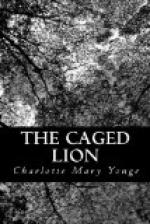For a long space there was perfect silence: and as Malcolm began to detach his thoughts from all that he had left behind, he could not help being struck with the expressions that flitted over his companion’s countenance. For a time he would seem lost in some deep mournful reverie, and his head drooped as if in sadness or perplexity; then a sudden gleam would light up his face, as if a brilliant project had occurred to him, his lips would part, his eyes flash, he would impel his horse forward as though leading a charge, or lift up his head with kindling looks, like one rehearsing a speech; but ever a check would come on him in the midst, his mouth closed in dejection, his brow drew together in an anguish of impatience, his eyelids drooped in weariness, and he would ride on in deep reflection, till roused perhaps by the flight of a moor-fowl, or the rush of a startled roe, he would hum some gay French hunting-song or plaintive Scottish ballad.
Scarcely a word had been uttered, until towards noon, on the borders of a little narrow valley, the merry sound of bells clashed up to their ears, and therewith sounds of music. ’’Tis the toon of Christ’s Kirk on the Green,’ said the squire, as Sir James looked at him for information, ’where we were to bait. Methought in Lent we had been spared this gallimawfrey.’
‘’Tis Midlent week, you pagan,’ replied Sir James. ’These good folk have come a-mothering, and a share of their simnels we’ll have.’
‘Sir,’ entreated the squire, ’were it not more prudent of you to tarry without, and let me fetch provisions?’
‘Hoot, man, a throng is our best friend! Besides, the horses must rest.’
So saying, Sir James rode eagerly forward; Malcolm following, not without wonder at not having been consulted, for though kept in strict discipline by his uncle, it had always been with every courtesy due to his rank as a king’s grandson; and the cousins, from whom he had suffered, were of the same rank with himself. Did this wandering landless knight, now he had him in his power, mean to disregard all that was his due? But when Sir James turned round his face sparkling with good-humour and amusement, and laughed as he said, ‘Now then for the humours of a Scottish fair!’ all his offended dignity was forgotten.
The greensward was surrounded by small huts and hovels; a little old stone church on one side, and a hostel near it, shadowed by a single tall elm, beneath which was the very centre of the village wake. Not only was it Midlent, but the day was the feast of a local saint, in whose honour Lenten requirements were relaxed. Monks and priests were there in plenty, and so were jugglers and maskers, Robin Hood and Marion, glee-men and harpers, merchants and hucksters, masterful beggars and sorners, shepherds in gray mauds with wise collies at their feet, shrewd old carlines with their winter’s spinning of yarn, lean wolf-like borderers peaceable for the nonce, merry lasses with tow-like locks floating from their snoods, all seen by the intensely glittering sun of a clear March day, dry and not too cold for these hardy northern folk.




